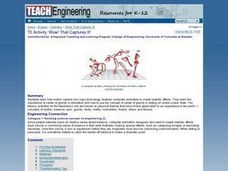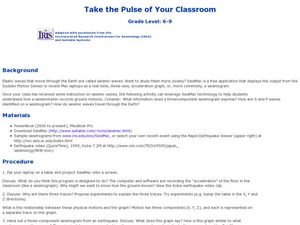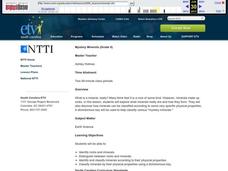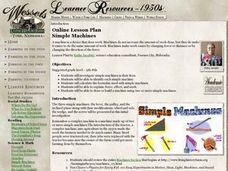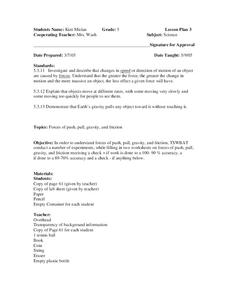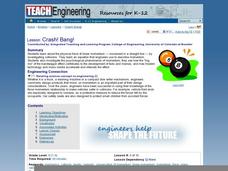Curated OER
FORCES, MOTION, AND ENERGY
Eighth graders engage in a variety of activities in order to investigate the basic concepts of physics. They read and answer questions in a written text. This is only one type of activity that is part of many others.
Curated OER
Merging Art and Science?
Students approach science through artwork. In this art and science instructional activity students work together to develop theories and gather data.
Curated OER
Newton's Third Law of Motion
Seventh graders are introduced to Newton's Third Law of Motion. In this physics lesson plan students examine the concept of thrust as one of the forces acting on aircraft.
Curated OER
Physics on the Playground
Second graders explain how friction affects the motion of moving objects. In this physics lesson, 2nd graders investigate how different materials move down the slide. They share their observations with each other.
Virginia Department of Education
Work and Power
Assist your class with correctly calculating the values for force, work, and power as they determine the amount various activities require. They gather data and participate in a group discussion to compare results upon conclusion of the...
Curated OER
Vectors
Students describe motion by the use of adding vectors to obtain the resultant vector. They comprehend the meaning of a resultant vector. Students identify the difference between the x and y components of vector quantities. Students...
Curated OER
Building a Roller Coaster
Students describe the law of conservation of energy. They identify the conversion between potential and kinetic energy. They investigate and describe the application of Newton's Laws of Motion.
Curated OER
Floating and Falling Flows
Students discover fluid dynamics related to buoyancy through experimentation and optional photography. Using one set of fluids, they make light fluids rise through denser fluids. Using another set, they make dense fluids sink through a...
Curated OER
Forces
In this forces worksheet, students read about what affects the force on an object. Students identify push forces and pull forces in 5 diagrams. They answer 13 questions about the forces in two diagrams and they draw vector diagrams to...
Curated OER
The Sun Affects Earth
Third graders read, write, and listen to information about the sun and its effects on the Earth.as it relates to its axis, orbit, rotate, and revolution. In this solar system lesson, 3rd graders examine how the sun effects the Earth's...
Curated OER
A Classical & Relativistic Trip to a Black Hole
Students calculate distance, velocity, acceleration and time on their fantasy trip to the black hold. They apply Newton's Laws of Motion and calculate circular motion. They discuss any questions that may arise.
Curated OER
TE Activity: Wow! That Captures It!
Students examine how motion capture technology allows computer based animators to design realistic effects in animation. They study how the center of gravity contributes to animation and how to use the center of gravity to write an...
Curated OER
Take the Pulse of Your Classroom
Students discuss seismic waves. In this science lesson, students investigate the acceleration of the floor in the classroom similar to a seismograph. Students observe a three-component seismogram from an earthquake and determine what it...
Curated OER
Simple Machines: The Wede & Lever
Students describe how wedge and lever makes work easier. In this physics lesson, students analyze experimental data by creating a graph to see the trends. They calculate the work done and mechanical advantage of these simple machines.
Curated OER
Properties of Matter (Biomaterial Through Nanotechnology)
Students investigate friction between different surfaces. In this physics lesson, students research biomaterials that can reduce friction. They calculate efficiency using a mathematical formula.
Curated OER
An Introduction to Sensors
Students research the International System (SI) of units of measurements. They make measurements using the metric system. They study key concepts used in building and use of sensors, how sensors work and their role in measuring...
Curated OER
Mystery Minerals
Students minerals and how they form. They investigate the classification of minerals according to physical properties. Students watch a video about mineral characteristics. In groups, students participate in hands-on activities and...
Curated OER
Ice Floats
Students explore the changing density of water. In this physics lesson plan, students investigate how an object's density determines whether it will float or sink in water. They explain why this unique property of is important to living...
Curated OER
Magnetorheological Fluids
Students conduct a series of experiments on magnetorheological fluids. In this physics lesson, students explain how these fluids behave in varying magnetic field strength. They give practical applications of magnetorheological fluids.
Curated OER
Farming in the 1930's
Students research and conduct experiments with several types of simple machines. They examine levers, pulleys, inclined planes, wheels, axles, wedges and screws and then consider the physics behind "Green Eggs and Ham".
Curated OER
Hot Cans and Cold Cans
Learners investigate the physics of heating and cooling through conduction, convection, and radiation. Working in groups, they determine the best way to cool a can of water and warm a can of water. Temperature is taken at five minute...
Curated OER
Force
Fifth graders move a variety of objects in different ways to observe the different forces. In this physics lesson, 5th graders observe pushing, pulling, gravity, and friction. The hands-on component, and teamwork involved, should make...
Curated OER
FRAMES OF REFERENCE: THE BASICS
Students examine the concept of frames of reference in physics: that two frames of reference, each moving with respect to the other with a constant velocity v, observe the same accelerations and therefore Newton's laws are the same in both.
Curated OER
Crash! Bang!
Young scholars study the physical force of linear momentum by investigating collisions. They analyze the difference between elastic and inelastic collisions. They calculate linear momentum.













